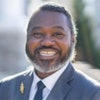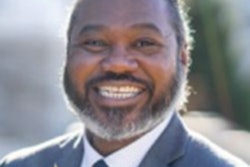Title: Associate Professor of Higher Education Leadership and Faculty Coordinator, Leadership Studies, Educational Leadership and Research Methodology, Florida Atlantic University.
Education: B.A., Spanish education, English as a Second Language; University of Nebraska at Kearney; master of education, student affairs and higher education, Iowa State University; Ph.D., higher education administration, Iowa State University
Age: 35 Mentors: “I’m afraid that if I say names, I will forget names, because there are so many people who have had an impact on my life. But I want to credit Black women because Black women have mentored me more than anyone else.”
Words of encouragement/wisdom: “The academy is tough but create your research and goal — set and try to accomplish it and find mentorship. Get mentorship from White faculty who have a lot of power and look for mentorship outside of your institution.”
By most standards, Dr. Cristobal “Criss” Salinas Jr. is a productive scholar. A tenured associate professor in the Department of Educational Leadership and Research Methodology at Florida Atlanta University, Salinas has published over 22 peer-reviewed articles and more than 27 book chapters and co-edited five books. He is also the founder and editor-in-chief of the Journal Committed to Social Change on Race and Ethnicity (JCSCORE).
The accolades for Salinas are many, including receiving over 25 international and national awards for his expansive research that focuses on promoting access and equity in higher education. An expert on Latinx students in college, the 35-year-old has emerged as a popular media pundit, offering commentary on CNN, NPR, Telemundo and “Good Morning America."
Born in Mexico, Salinas’ family was thrown into turmoil after his father was kidnapped by police officers in a neighboring town. The family fled to Nebraska, where Salinas was often the only Latino in middle and high school.
“It gave me a lot of context for growing up in White America,” says Salinas, adding that he quickly found that, despite racism, White educators also emerged as some of his biggest supporters, providing the mentorship he needed in order to progress as a first-generation American student.




















